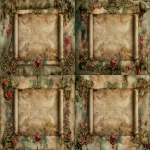Explore the Best AI Image Gallery

Beyond the Screen: How VR and AR Are Transforming the Gaming Landscape
The gaming world is on the cusp of a monumental shift. Virtual Reality (VR) and Augmented Reality (AR) are no longer futuristic fantasies; theyre powerful technologies reshaping the very fabric of how we experience games. Beyond their undeniable potential for immersive entertainment, VR and AR are impacting the creative industry, opening doors to unprecedented artistic expression and collaborative experiences.
A New Realm of Immersive Gameplay
Imagine stepping into a fantasy world, not just seeing it on a screen. Thats the power of VR. Players don headsets that transport them into fully realized 3D environments, allowing for unparalleled interaction with characters, objects, and landscapes. This level of immersion creates a sense of presence that traditional gaming simply cant match.
AR, on the other hand, overlays digital elements onto the real world, enhancing our perception of reality. Imagine battling zombies in your living room or solving puzzles scattered across your neighborhood. AR games blend the physical and digital, creating a dynamic and unpredictable gameplay experience.
The Creative Canvas Redefined
VR and AR are not just about entertainment; theyre powerful tools for artistic expression. Game developers can now create worlds that are visually stunning and intricately detailed, pushing the boundaries of imagination. The ability to interact with these worlds in a physical way opens up new possibilities for storytelling and player agency.
Artists and designers are also exploring VR and AR as mediums for creative exploration. Imagine sculpting in 3D space or painting on virtual canvases that react to your movements. These technologies empower creators to experiment with new forms of expression and share their work in immersive ways.
Collaborative Worlds
VR and AR foster a sense of shared experience, enabling players to connect and interact in entirely new ways. Multiplayer VR games allow friends to team up and explore virtual worlds together, building camaraderie and forging lasting bonds.
AR can also bridge the gap between physical and digital spaces. Imagine attending a concert where avatars of your friends appear alongside you, or collaborating on a project with colleagues from around the world in a shared AR workspace.
Ethical Considerations
As immersive technologies become more prevalent, its crucial to consider their ethical implications. Issues such as data privacy, user safety, and the potential for addiction require careful attention. Developers and policymakers must work together to ensure that VR and AR are used responsibly and ethically.
The Future of Gaming: A World Without Boundaries
VR and AR are poised to revolutionize gaming, blurring the lines between reality and virtuality. As these technologies continue to evolve, we can expect even more immersive and engaging experiences, pushing the boundaries of creativity and connectivity. The future of gaming is a world without boundaries, where imagination knows no limits.


](https://images.ai-img.art/thumbnails/150/efd8a9ad06ef2c72e3378698ad5e592d3d2bf8eff85c25e75db7c9902c7be353.webp)





](https://images.ai-img.art/thumbnails/150/031692dcf8fbf869092e8cea50f9411a45dadc1f189ea67b8dece8e02952a7e3.webp)



](https://images.ai-img.art/thumbnails/150/7599c9e7507c77a975081d554947c9dea123e678a7ece42d30f571f639620598.webp)